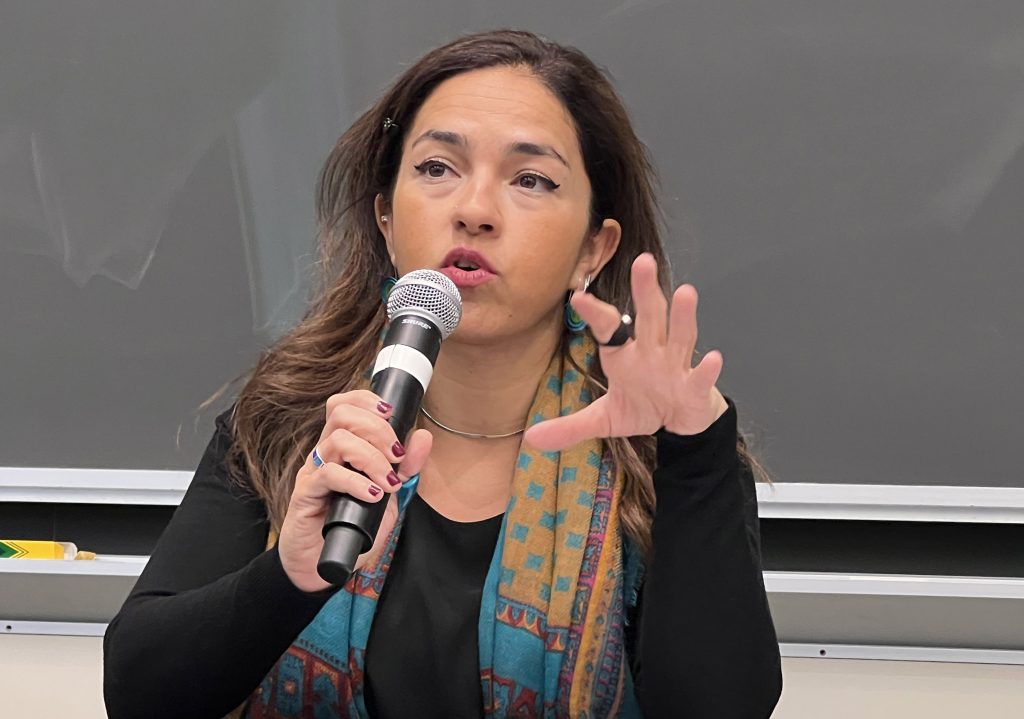The preamble to the UN Charter affirms the United Nations’ essential goals to reaffirm faith in fundamental human rights and ensure justice and respect for all parties’ obligations under international law. In global responses to mass atrocities, has that really been the case?
On February 29, BC Law’s Holocaust/Human Rights Project (HHRP) held the annual Owen M. Kupferschmid Memorial Lecture to address this very question. The program began with opening remarks from Associate Dean for Faculty and Global Programs Katharine Young, and was moderated by the president of HHRP, Eliot Usherenko. They both discussed the driving mission of the project, co-founded by BC Law alumnus Owen M. Kupferschmid, and how these lectures serve to advance his legacy as a human rights advocate, while noting that different speakers may approach this underlying goal in varying ways.
This year’s speaker, Noha Aboueldahab, is a scholar and assistant professor at Georgetown University in Qatar who specializes in public international law, transitional justice, and the laws of war. Her discussion, titled “The ICJ, the UN, and Accountability for Mass Atrocities: The Global South’s Power Play?”, examined the successes and shortcomings of international legal institutions and their ability to seek accountability for human rights crises.
Aboueldahab’s discussion centered on the often cited question in international law debates: If the ICJ has no enforcement power, then what’s the point? She tackled this in three parts, highlighting 1) the problem of enforcement and dehumanization in international law, 2) international lawyers’ engagement with the media, and 3) the impact of Global South actors’ role in international law. She used the ongoing International Court of Justice (ICJ) lawsuit brought by South Africa against Israel’s military actions in Gaza during the Israel-Hamas war as indicative of the ongoing debate in international law.
In her view, this lawsuit, much like the rest of international law, serves both legal and symbolic aims. A decision from the ICJ sends a strong message that such crimes are condemnable—no one is above accountability when it comes to mass atrocities. She argued that questions of (non)-enforcement miss that at the heart of human rights conflicts are “humans.” International legal institutions work alongside civil society, grassroots organizations, even the media, to get at the heart of what’s actually happening on the ground.
Aboudeldahab honed in on this idea, emphasizing the need for increased media literacy amongst international lawyers. The media critically shapes public opinion around human rights conflicts, and such investment allows international law discourse to become more digestible, accessible, and informed. Amplified media engagement, mass demonstrations, lawsuits before the ICJ, all push the developing world towards a brighter future, she said.
In conclusion, Aboueldahab pressed for an imminent solution in the Global South as tensions escalate in Gaza and civil conflict rages on in Yemen. Such a combined effort that mobilizes actors, signifies solidarity, and applies pressure, is what she sees as the effective form of justice. She also expressed hope for the international legal system, despite its faults.
Her sentiment was seconded when, during a Q&A session at the end of her talk, an audience member cited a statement from the most prominent human rights trials to date, the Nuremberg Trials: “The court of humanity will never adjourn.”


